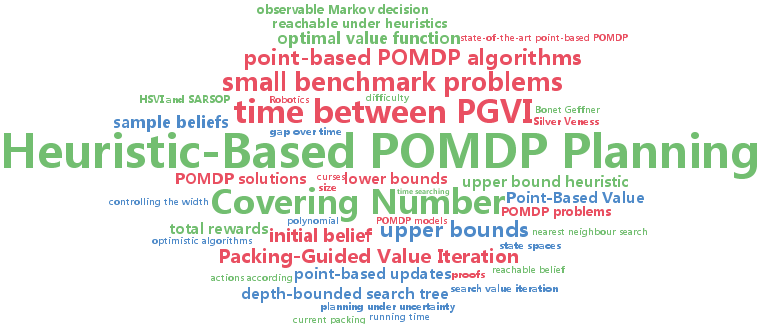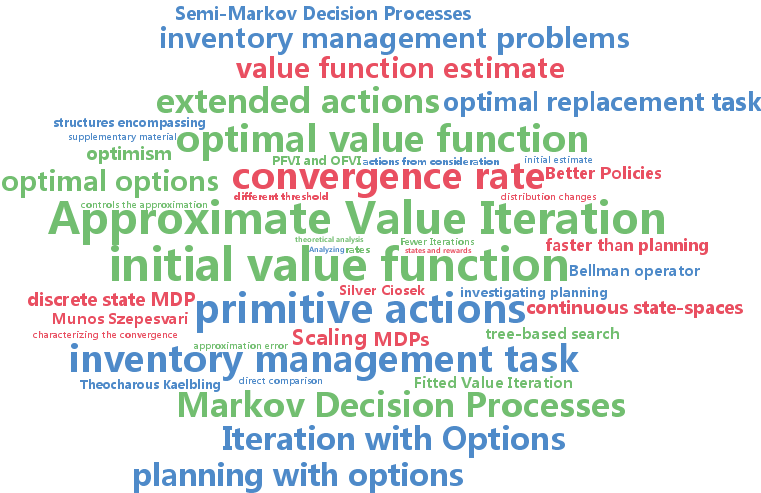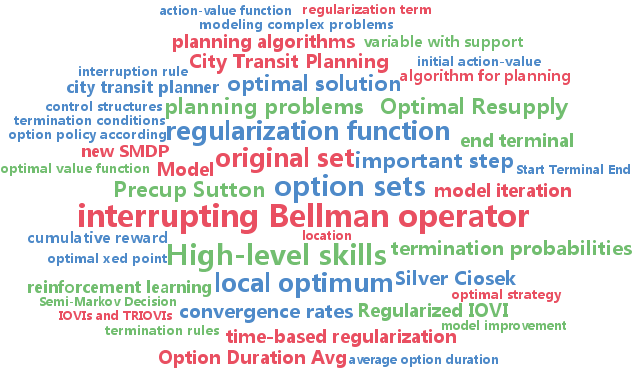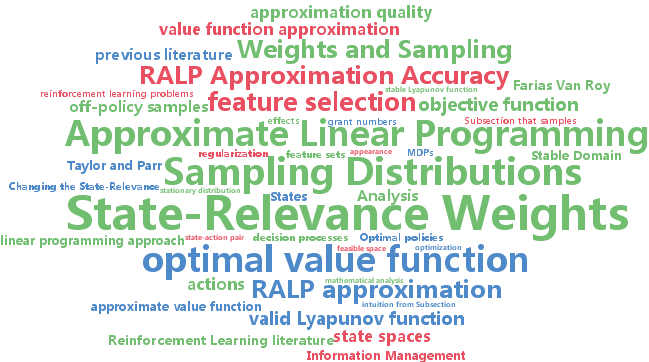optimal value function
-
Zongzhang Zhang and David Hsu and Wee Sun Lee
Covering Number for Efficient Heuristic-based POMDP Planning (pdf)
The difficulty of POMDP planning depends on the size of the search space involved. Heuristics are often used to reduce the search space size and improve computational efficiency; however, there are few theoretical bounds on their effectiveness. In this paper, we use the covering number to characterize the size of the search space reachable under heuristics and connect the complexity of POMDP planning to the effectiveness of heuristics. With insights from the theoretical analysis, we have developed a practical POMDP algorithm, Packing-Guided Value Iteration (PGVI). Empirically, PGVI is competitive with the state-of-the-art point-based POMDP algorithms on 65 small benchmark problems and outperforms them on 4 larger problems.
-
Timothy Mann and Shie Mannor
Scaling Up Approximate Value Iteration with Options: Better Policies with Fewer Iterations (pdf)
We show how options, a class of control structures encompassing primitive and temporally extended actions, can play a valuable role in planning in MDPs with continuous state-spaces. Analyzing the convergence rate of Approximate Value Iteration with options reveals that for pessimistic initial value function estimates, options can speed up convergence compared to planning with only primitive actions even when the temporally extended actions are suboptimal and sparsely scattered throughout the state-space. Our experimental results in an optimal replacement task and a complex inventory management task demonstrate the potential for options to speed up convergence in practice. We show that options induce faster convergence to the optimal value function, which implies deriving better policies with fewer iterations.
-
Timothy Mann and Daniel Mankowitz and Shie Mannor
Time-Regularized Interrupting Options (TRIO) (pdf)
High-level skills relieve planning algorithms from low-level details. But when the skills are poorly designed for the domain, the resulting plan may be severely suboptimal. Sutton et al. 1999 made an important step towards resolving this problem by introducing a rule that automatically improves a set of skills called options. This rule terminates an option early whenever switching to another option gives a higher value than continuing with the current option. However, they only analyzed the case where the improvement rule is applied once. We show conditions where this rule converges to the optimal set of options. A new Bellman-like operator that simultaneously improves the set of options is at the core of our analysis. One problem with the update rule is that it tends to favor lower-level skills. Therefore we introduce a regularization term that favors longer duration skills. Experimental results demonstrate that this approach can derive a good set of high-level skills even when the original set of skills cannot solve the problem.
-
Gavin Taylor and Connor Geer and David Piekut
An Analysis of State-Relevance Weights and Sampling Distributions on L1-Regularized Approximate Linear Programming Approximation Accuracy (pdf)
Recent interest in the use of $L_1$ regularization in the use of value function approximation includes Petrik et al.'s introduction of $L_1$-Regularized Approximate Linear Programming (RALP). RALP is unique among $L_1$-regularized approaches in that it approximates the optimal value function using off-policy samples. Additionally, it produces policies which outperform those of previous methods, such as LSPI. RALP's value function approximation quality is affected heavily by the choice of state-relevance weights in the objective function of the linear program, and by the distribution from which samples are drawn; however, there has been no discussion of these considerations in the previous literature. In this paper, we discuss and explain the effects of choices in the state-relevance weights and sampling distribution on approximation quality, using both theoretical and experimental illustrations. The results provide insight not only onto these effects, but also provide intuition into the types of MDPs which are especially well suited for approximation with RALP.



